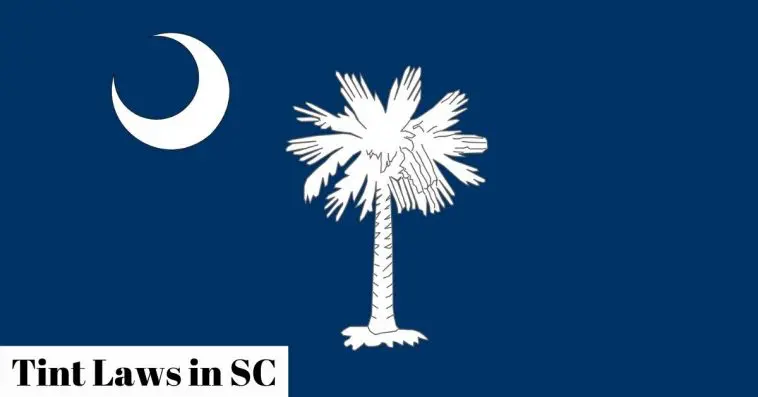If you are curious about window tint laws in the state of South Carolina, you’re in the right place.
Some people want them thanks to the increased privacy the windows give them, others just want to keep the sun out of the vehicle for added comfort.
Whatever your reasoning for desiring window tints on your ride, see my info below about what you can legally have in the Palmetto State for tinted auto windows.
TABLE OF CONTENTS
Can You Have Your Windshield and Windows Tinted In South Carolina?
Yes, drivers are permitted to have tinted windows in South Carolina. However, you must be careful to install tints that meet the state requirements as outlined below to avoid tickets or citations. It is important that you not just tint the windows as you see fit- this could land you in trouble with the law.
What Is The Darkest Tints Drivers Can Get Legally In SC?
The highest amount of tint you can legally have in SC is 27% VLT. VLT stands for “visible light transmission,” and represents the amount of light that must come through in order for the tints to be legal. Of course, this also varies for SUVs, sedans, and utility vehicles.
Is 20 Tint Against The Law In C?
Yes, 20 tint is for the most part illegal. It is because the darkest tints allowed in SC is 27%, therefore you would not be permitted to have 20% tints, except for on the back side windows and rear windows of MPVs (multipurpose vehicles).
Will You Get Stopped By Officers For Tinted Windows In South Carolina?
You can absolutely be pulled over if your tints are too dark in South Carolina. A 2017 article from the Newberry Observer reported on a situation taking place in Prosperity, SC.
Add-ons to cars, trucks, and SUVs such as tinted windows were causing people to be stopped by law enforcement. Some of these individuals no doubt had to pay a fine.
The Fine For A Tint Infraction In SC
The fine for a tint infraction is no less than $200, or imprisonment of no more than 30 days for each offense, states the Newberry Observer article.
If the violation is a minor one, the officer may issue a warning citation, but one cannot count on this to happen- generally this is only for first offenses, and offers the chance for the violator to fix their infraction and have their case dismissed.
Let’s also talk about some other things to know so you can stay out of trouble with law enforcement.
If you do decide to get your vehicle tinted, the colors of amber yellow, and red are not permitted by state law.
- The sticker used to identify tints that are of the legal limit is required in between the glass and film on each of the tinted windows.
- It’s a requirement for tint dealers to certify their film. Ask your dealer to see it before you pay for services or schedule an appointment to have it done.
- Dual side mirrors are a requirement if your back windows are tinted.
All things considered, it’s best to just get your tints applied professionally so you are within the parameters of the law and don’t have to worry about it.
Darkness Levels Acceptable For Tints In South Carolina
At this time, I would like to address the tint rules for three main types of vehicles.
For Passenger Vehicles
- Windshield: Non-reflective tint can be applied above the AS1 line as indicated by the manufacturer
- Front Windows On The Side: Tints must allow 27% light to come through
- Back Windows On The Side: Tints must allow 27% light to come through
- Rear Windows: Tints must allow 27% light to come through
For MPVs (Multipurpose Vehicles)
- Windshield: Tint that is not reflective can be applied above the AS-1 line as indicated by the manufacturer
- Front Windows On The Side: Tints must allow 27% of light to come through
- Back Windows On The Side: Any level of darkness may be used so long as it is applied several in, from the topmost part of the glass
- Rear Windows: Any level of darkness is allowed
Reflection Of Window Tint In South Carolina
Now let’s talk about window tint reflection. These types of tints are great at reflecting light and lowering the heat level of your vehicle. They can also reduce the glare as well.
They let people standing outside your vehicle see themselves in the windows, but not you. But the question is, are they allowed in the state of SC? Read on to find out.
For Passenger Vehicle
- Side Windows On The Front: Reflective tints not permitted
- Side Windows On The Back: Reflective tints not permitted
For MPVs (Multipurpose Vehicles)
- Side Windows: For both front and back, reflective tints are NOT permitted in South Carolina
Attaining Medical Exemption Regarding Window Tints In South Carolina
In order to get yourself a medical tint exemption in the state of South Carolina, you must acquire a signed affidavit by a licensed optometrist or physician. This affidavit must remain inside your vehicle at all times.
The affidavit has to state that the individual has a physical condition that makes it a requirement the vehicle be outfitted with darker than legally permitted window tints. You must update the affidavit every two years.
Conclusion
As you can see, the window tint laws of South Carolina can be confusing if you don’t know where to look. Avoid all that by making sure you go to a reputable tint dealer if you would like to apply tints to your vehicle.
Vehicle tinting is great because you get added privacy, greater comfort while driving and your passengers also enjoy the effects.
But it’s not worth having to deal with law enforcement or pay hefty fines (or go to jail). By knowing and following the laws, you will have an easier time wherever you go.




